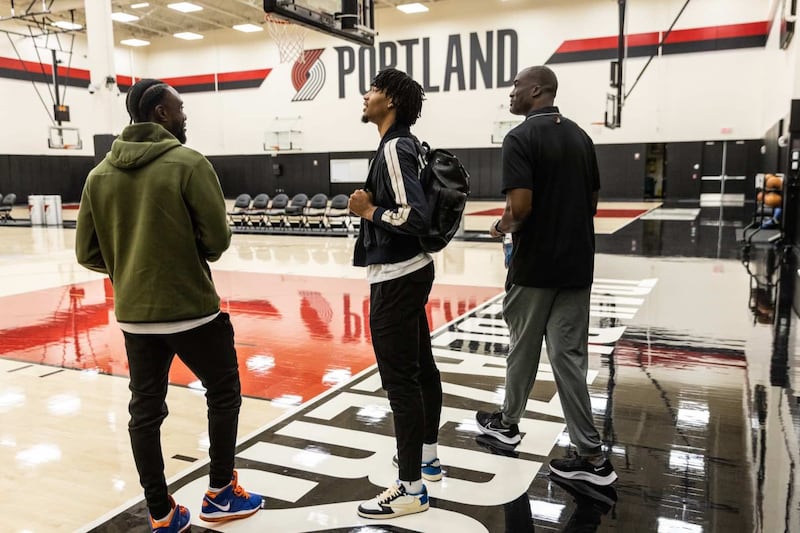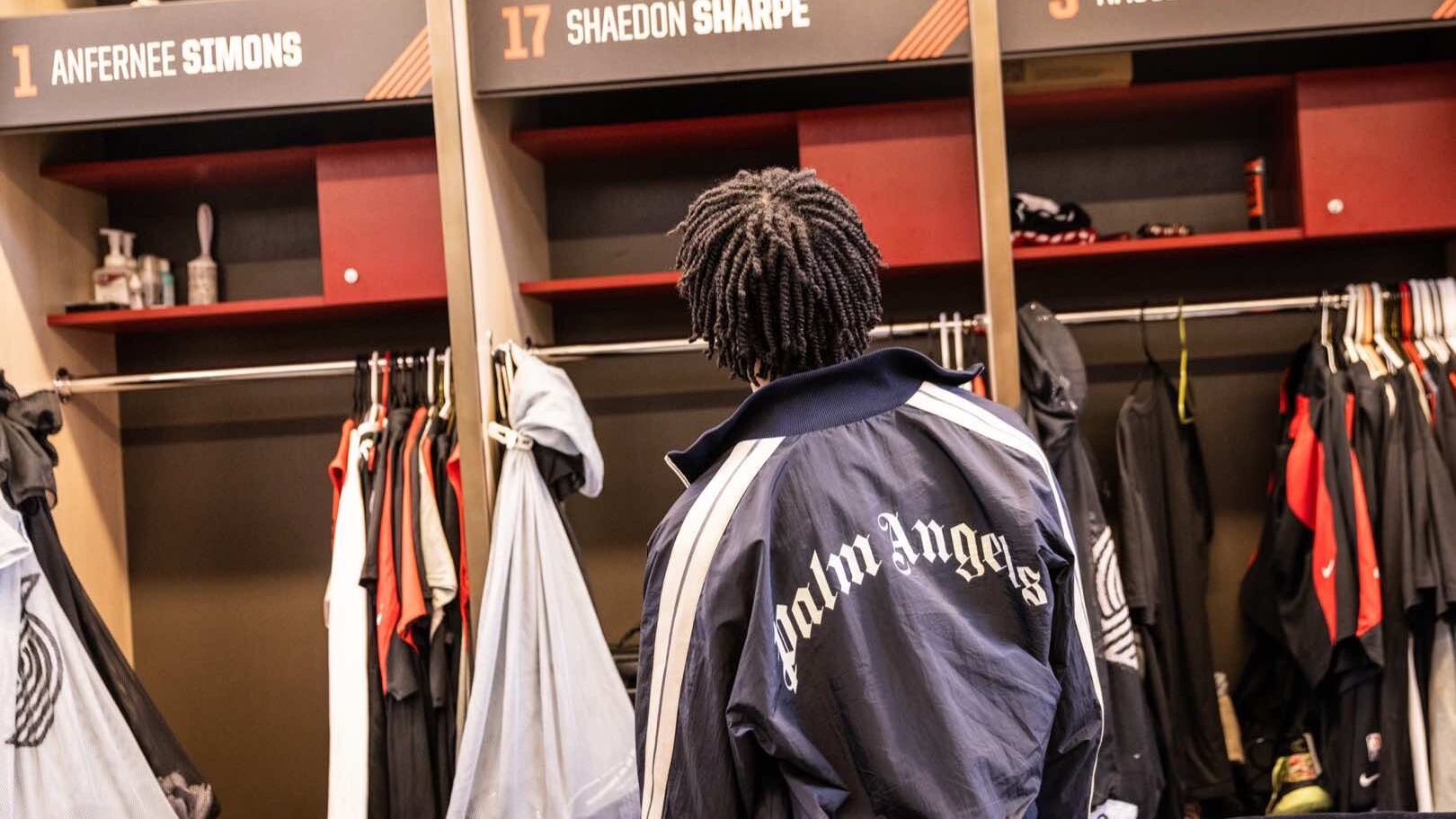The Portland Trail Blazers finally took a step forward this week.
General manager Joe Cronin acquired Jerami Grant from the Detroit Pistons for a future first-round NBA draft pick and selected Shaedon Sharpe with the seventh overall pick in this year’s draft.
Grant, a 6-foot-8 forward, is a bona fide NBA starter, averaging 21 points per game on 35% 3-point shooting over the past two seasons with the Pistons. He’s not the All-NBA defender the Blazers eventually need to find, but Grant easily eclipses Al-Farouq Aminu as the team’s most talented forward since LaMarcus Aldridge left in 2015.
The price to acquire Grant makes the news even better: Cronin only had to give up a 2025 first-round pick owed to the Blazers from the Milwaukee Bucks (and a few additional second-round picks, the basketball equivalent of scratch-off tickets). That Bucks pick will likely land in the late first round given Giannis Antetokounmpo’s continued ascendence—the better a team’s record, the worse its pick.
In other words, the Blazers got a legit NBA starter for a mediocre draft pick that can’t be used for three years and some pocket change. That’s a huge win.
Meanwhile, Cronin’s decision to take Sharpe with a lottery pick is a throwback to the prep-to-pros era of the NBA draft.
Sharpe enrolled at the University of Kentucky after finishing high school a semester early and never appeared in a game for the Wildcats. He wasn’t hurt; he just decided NCAA ball was all risk, no reward. It’s the same decision players like Kobe Bryant used to make—Sharpe and his advisers just took advantage of his early graduation to petition for immediate NBA eligibility. Their plan is about to pay off.
Despite being a relative unknown, the 6-foot-6 Sharpe has already shown flashes of high potential. He was widely touted as the top prospect in his high school class and has played for an under-19 Canadian team.
For his part, Cronin did not seem concerned with Sharpe’s lack of collegiate experience. “Shaedon is an incredible talent, and we are really excited about his future,” Cronin said at a post-draft press conference. “He was in a unique situation where he didn’t play college basketball…but we had a pretty good foundation built on Shaedon based through past viewings, specifically by some of our new people who have seen him quite a bit.”
(The “new people” comment likely refers to former ESPN commentator Mike Schmitz, who recently joined the Blazers and has gone on record endorsing Sharpe’s potential.)
Make no mistake: This is a speculative pick by the Blazers. Sharpe brings oodles of athleticism and a surprisingly mature offensive skill set but hasn’t seen competitive on-court action in over a year.
Nevertheless, the Blazers are living through talent poverty right now. They must take a few high-risk home run swings if they want to compete in the twilight of Damian Lillard’s prime. Drafting Sharpe certainly qualifies. Now Cronin just has to hope he’s more Jermaine O’Neal than Bassy Telfair.
Before selecting Sharpe, the Blazers’ draft pick was linked to trade rumors regarding OG Anunoby, Lu Dort and John Collins. Cronin ultimately decided using the pick was preferable to trading for a veteran.
“It ended up that nobody wowed us,” Cronin said. “[Sharpe’s] future is as bright as many of the players we were considering that were a little more experienced. We’re excited.”
In other words, the Blazers saw an opportunity to snag a player with All-Star upside and took it. The alternative would have been swapping the seventh pick for a later one and a veteran like Collins or Dort—and the large salaries that one of those veterans would command.
Shelling out big money for another solid-starter-but-not-quite-star would only complicate future moves. The Blazers already have multiple nonstar veterans expecting big paydays. (Anunoby, who does have significant upside, would have been a far more enticing trade acquisition, but Toronto’s price was reportedly too high.) Taking Sharpe was the best middle-ground approach; Cronin maintains a modicum of cap flexibility while also (hopefully) injecting top-flight talent into the roster.

Acquiring Grant and drafting Sharpe hardly solves the Blazers’ current woes.
This year’s roster is incomplete. They still need elite defensive talent to compensate for the offensive-centric play of Lillard and Anfernee Simons. Cronin has to negotiate new big-money contracts with Simons, Jusuf Nurkic, Grant and Josh Hart over the next 13 months as those players enter free agency—the Blazers will not have cap space for a while. The bench remains laughably shallow.
And Cronin doesn’t have all the tools he could use to build a future version of the team. The Blazers have limited draft capital, owing a future first pick to the Chicago Bulls and several future second-round picks to other teams.
In short, the front office hasn’t built an immediate contender and doesn’t have the draft picks to rebuild from scratch. Instead, Cronin is looking to make prudent moves that preserve the Blazers’ immediate playoff chances while offering a chance at transcendence later.
Cronin acknowledges his work isn’t done. “We know we’re not good enough. We want to keep trying to get better,” Cronin said. “The draft is not the end-all as far as trades go. The trade deadline isn’t for another almost nine months.”
But the frankness with which he outlined that strategy stands in stark contrast to the hollow offseason promises of former general manager Neil Olshey. Gone are the days of false bravado around reclamation projects like Hassan Whiteside or Mario Hezonja.
Unlike in those Olshey offseasons, this time we can say with certainty that the team is more talented than it was a week ago.
Double Dribbles
· The Blazers also drafted Jabari Walker, a 6-foot-9 3-and-D wing from Colorado, with the second-to-last pick of the draft.
· Grant’s father, Harvey, played for the Blazers in the mid-’90s. The elder Grant was acquired in trade for Kevin Duckworth on June 24, 1993—almost exactly 29 years prior to his son’s arrival in Portland. Jerami was born in Portland on March 12, 1994.
· Friend of the franchise CJ McCollum approved of the Grant trade. The move wouldn’t have been possible without McCollum—Grant’s salary was absorbed into the trade exception that was created when the Blazers sent McCollum to the Pelicans earlier this year. In the end, the Blazers swapped McCollum and Larry Nance for Hart and Grant. Make of that what you will.
· Grant and Lillard played together previously on the 2021 Olympic team that won a gold medal in Tokyo. It’s all but certain the two players discussed teaming up then. Like the Heatles, but on rather a smaller scale.
· Former Blazer Caleb Swanigan died earlier this week at the age of 25. His story is intensely sad.
